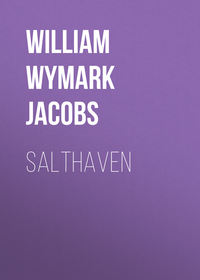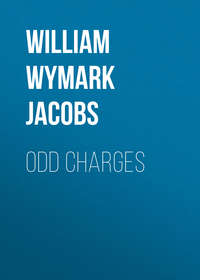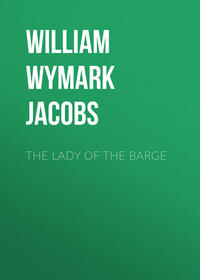 полная версия
полная версияShort Cruises
It’s ‘ard lines though, sometimes, waiting for other people’s money. I knew o’ one chap that waited over forty years for ‘is grandmother to die and leave ‘im her money; and she died of catching cold at ‘is funeral. Another chap I knew, arter waiting years and years for ‘is rich aunt to die, was hung because she committed suicide.
It’s always risky work waiting for other people to die and leave you money. Sometimes they don’t die; sometimes they marry agin; and sometimes they leave it to other people instead.
Talking of marrying agin reminds me o’ something that ‘appened to a young fellow I knew named Alf Simms. Being an orphan ‘e was brought up by his uncle, George Hatchard, a widowed man of about sixty. Alf used to go to sea off and on, but more off than on, his uncle ‘aving quite a tidy bit of ‘ouse property, and it being understood that Alf was to have it arter he ‘ad gone. His uncle used to like to ‘ave him at ‘ome, and Alf didn’t like work, so it suited both parties.
I used to give Alf a bit of advice sometimes, sixty being a dangerous age for a man, especially when he ‘as been a widower for so long he ‘as had time to forget wot being married’s like; but I must do Alf the credit to say it wasn’t wanted. He ‘ad got a very old ‘ead on his shoulders, and always picked the housekeeper ‘imself to save the old man the trouble. I saw two of ‘em, and I dare say I could ‘ave seen more, only I didn’t want to.
Cleverness is a good thing in its way, but there’s such a thing as being too clever, and the last ‘ouse-keeper young Alf picked died of old age a week arter he ‘ad gone to sea. She passed away while she was drawing George Hatchard’s supper beer, and he lost ten gallons o’ the best bitter ale and his ‘ousekeeper at the same time.
It was four months arter that afore Alf came ‘ome, and the fust sight of the new ‘ousekeeper, wot opened the door to ‘im, upset ‘im terrible. She was the right side o’ sixty to begin with, and only ordinary plain. Then she was as clean as a new pin, and dressed up as though she was going out to tea.
“Oh, you’re Alfred, I s’pose?” she ses, looking at ‘im.
“Mr. Simms is my name,” ses young Alf, starting and drawing hisself up.
“I know you by your portrait,” ses the ‘ousekeeper. “Come in. ‘Ave you ‘ad a pleasant v’y’ge? Wipe your boots.”
Alfred wiped ‘is boots afore he thought of wot he was doing. Then he drew hisself up stiff agin and marched into the parlor.
“Sit down,” ses the ‘ousekeeper, in a kind voice.
Alfred sat down afore he thought wot ‘e was doing agin.
“I always like to see people comfortable,” ses the ‘ousekeeper; “it’s my way. It’s warm weather for the time o’ year, ain’t it? George is upstairs, but he’ll be down in a minute.”
“Who?” ses Alf, hardly able to believe his ears.
“George,” ses the ‘ousekeeper.
“George? George who?” ses Alfred, very severe.
“Why your uncle, of course,” ses the ‘ousekeeper. “Do you think I’ve got a houseful of Georges?”
Young Alf sat staring at her and couldn’t say a word. He noticed that the room ‘ad been altered, and that there was a big photygraph of her stuck up on the mantelpiece. He sat there fidgeting with ‘is feet—until the ‘ousekeeper looked at them—and then ‘e got up and walked upstairs.
His uncle, wot was sitting on his bed when ‘e went into the room and pretended that he ‘adn’t heard ‘im come in, shook hands with ‘im as though he’d never leave off.
“I’ve got something to tell you, Alf,” he ses, arter they ‘ad said “How d’ye do?” and he ‘ad talked about the weather until Alf was fair tired of it.
“I’ve been and gone and done a foolish thing, and ‘ow you’ll take it I don’t know.”
“Been and asked the new ‘ousekeeper to marry you, I s’pose?” ses Alf, looking at ‘im very hard.
His uncle shook his ‘ead. “I never asked ‘er; I’d take my Davy I didn’t,” he ses.
“Well, you ain’t going to marry her, then?” ses Alf, brightening up.
His uncle shook his ‘ead agin. “She didn’t want no asking,” he ses, speaking very slow and mournful. “I just ‘appened to put my arm round her waist by accident one day and the thing was done.”
“Accident? How could you do it by accident?” ses Alf, firing up.
“How can I tell you that?” ses George Hatchard. “‘If I’d known ‘ow, it wouldn’t ‘ave been an accident, would it?”
“Don’t you want to marry her?” ses Alf, at last. “You needn’t marry ‘er if you don’t want to.”
George Hatchard looked at ‘im and sniffed. “When you know her as well as I do you won’t talk so foolish,” he ses. “We’d better go down now, else she’ll think we’ve been talking about ‘er.”
They went downstairs and ‘ad tea together, and young Alf soon see the truth of his uncle’s remarks. Mrs. Pearce—that was the ‘ousekeeper’s name—called his uncle “dear” every time she spoke to ‘im, and arter tea she sat on the sofa side by side with ‘im and held his ‘and.
Alf lay awake arf that night thinking things over and ‘ow to get Mrs. Pearce out of the house, and he woke up next morning with it still on ‘is mind. Every time he got ‘is uncle alone he spoke to ‘im about it, and told ‘im to pack Mrs. Pearce off with a month’s wages, but George Hatchard wouldn’t listen to ‘im.
“She’d ‘ave me up for breach of promise and ruin me,” he ses. “She reads the paper to me every Sunday arternoon, mostly breach of promise cases, and she’d ‘ave me up for it as soon as look at me. She’s got ‘eaps and ‘eaps of love-letters o’ mine.”
“Love-letters!” ses Alf, staring. “Love-letters when you live in the same house!”
“She started it,” ses his uncle; “she pushed one under my door one morning, and I ‘ad to answer it. She wouldn’t come down and get my breakfast till I did. I have to send her one every morning.”
“Do you sign ‘em with your own name?” ses Alf, arter thinking a bit.
“No,” ses ‘is uncle, turning red.
“Wot do you sign ‘em, then?” ses Alf.
“Never you mind,” ses his uncle, turning redder. “It’s my handwriting, and that’s good enough for her. I did try writing backwards, but I only did it once. I wouldn’t do it agin for fifty pounds. You ought to ha’ heard ‘er.”
“If ‘er fust husband was alive she couldn’t marry you,” ses Alf, very slow and thoughtful.
“No,” ses his uncle, nasty-like; “and if I was an old woman she couldn’t marry me. You know as well as I do that he went down with the Evening Star fifteen years ago.”
“So far as she knows,” ses Alf; “but there was four of them saved, so why not five? Mightn’t ‘e have floated away on a spar or something and been picked up? Can’t you dream it three nights running, and tell ‘er that you feel certain sure he’s alive?”
“If I dreamt it fifty times it wouldn’t make any difference,” ses George Hatchard. “Here! wot are you up to? ‘Ave you gone mad, or wot? You poke me in the ribs like that agin if you dare.”
“Her fust ‘usband’s alive,” ses Alf, smiling at un.
“Wot?” ses his uncle.
“He floated away on a bit o’ wreckage,” ses Alf, nodding at ‘im, “just like they do in books, and was picked up more dead than alive and took to Melbourne. He’s now living up-country working on a sheep station.”
“Who’s dreaming now?” ses his uncle.
“It’s a fact,” ses Alf. “I know a chap wot’s met ‘im and talked to ‘im. She can’t marry you while he’s alive, can she?”
“Certainly not,” ses George Hatchard, trembling all over; “but are you sure you ‘aven’t made a mistake?”
“Certain sure,” ses Alf.
“It’s too good to be true,” ses George Hatchard.
“O’ course it is,” ses Alf, “but she won’t know that. Look ‘ere; you write down all the things that she ‘as told you about herself and give it to me, and I’ll soon find the chap I spoke of wot’s met ‘im. He’d meet a dozen men if it was made worth his while.”
George Hatchard couldn’t understand ‘im at fust, and when he did he wouldn’t ‘ave a hand in it because it wasn’t the right thing to do, and because he felt sure that Mrs. Pearce would find it out. But at last ‘e wrote out all about her for Alf; her maiden name, and where she was born, and everything; and then he told Alf that, if ‘e dared to play such a trick on an unsuspecting, loving woman, he’d never forgive ‘im.
“I shall want a couple o’ quid,” ses Alf.
“Certainly not,” ses his uncle. “I won’t ‘ave nothing to do with it, I tell you.”
“Only to buy chocolates with,” ses Alf.
“Oh, all right,” ses George Hatchard; and he went upstairs to ‘is bedroom and came down with three pounds and gave ‘im. “If that ain’t enough,” he ses, “let me know, and you can ‘ave more.”
Alf winked at ‘im, but the old man drew hisself up and stared at ‘im, and then ‘e turned and walked away with his ‘ead in the air.
He ‘ardly got a chance of speaking to Alf next day, Mrs. Pearce being ‘ere, there, and everywhere, as the saying is, and finding so many little odd jobs for Alf to do that there was no time for talking. But the day arter he sidled up to ‘im when the ‘ouse-keeper was out of the room and asked ‘im whether he ‘ad bought the chocolates.
“Yes,” ses Alfred, taking one out of ‘is pocket and eating it, “some of ‘em.”
George Hatchard coughed and fidgeted about. “When are you going to buy the others?” he ses.
“As I want ‘em,” ses Alf. “They’d spoil if I got ‘em all at once.”
George Hatchard coughed agin. “I ‘ope you haven’t been going on with that wicked plan you spoke to me about the other night,” he ses.
“Certainly not,” ses Alf, winking to ‘imself; “not arter wot you said. How could I?”
“That’s right,” ses the old man. “I’m sorry for this marriage for your sake, Alf. O’ course, I was going to leave you my little bit of ‘ouse property, but I suppose now it’ll ‘ave to be left to her. Well, well, I s’pose it’s best for a young man to make his own way in the world.”
“I s’pose so,” ses Alf.
“Mrs. Pearce was asking only yesterday when you was going back to sea agin,” ses his uncle, looking at ‘im.
“Oh!” ses Alf.
“She’s took a dislike to you, I think,” ses the old man. “It’s very ‘ard, my fav’rite nephew, and the only one I’ve got. I forgot to tell you the other day that her fust ‘usband, Charlie Pearce, ‘ad a kind of a wart on ‘is left ear. She’s often spoke to me about it.”
“In—deed!” ses Alf.
“Yes,” ses his uncle, “left ear, and a scar on his forehead where a friend of his kicked ‘im one day.”
Alf nodded, and then he winked at ‘im agin. George Hatchard didn’t wink back, but he patted ‘im on the shoulder and said ‘ow well he was filling out, and ‘ow he got more like ‘is pore mother every day he lived.
“I ‘ad a dream last night,” ses Alf. “I dreamt that a man I know named Bill Flurry, but wot called ‘imself another name in my dream, and didn’t know me then, came ‘ere one evening when we was all sitting down at supper, Joe Morgan and ‘is missis being here, and said as ‘ow Mrs. Pearce’s fust husband was alive and well.”
“That’s a very odd dream,” ses his uncle; “but wot was Joe Morgan and his missis in it for?”
“Witnesses,” ses Alf.
George Hatchard fell over a footstool with surprise. “Go on,” he ses, rubbing his leg. “It’s a queer thing, but I was going to ask the Morgans ‘ere to spend the evening next Wednesday.”
“Or was it Tuesday?” ses Alf, considering.
“I said Tuesday,” ses his uncle, looking over Alf’s head so that he needn’t see ‘im wink agin. “Wot was the end of your dream, Alf?”
“The end of it was,” ses Alf, “that you and Mrs. Pearce was both very much upset, as o’ course you couldn’t marry while ‘er fust was alive, and the last thing I see afore I woke up was her boxes standing at the front door waiting for a cab.”
George Hatchard was going to ask ‘im more about it, but just then Mrs. Pearce came in with a pair of Alf’s socks that he ‘ad been untidy enough to leave in the middle of the floor instead of chucking ‘em under the bed. She was so unpleasant about it that, if it hadn’t ha’ been for the thought of wot was going to ‘appen on Tuesday, Alf couldn’t ha’ stood it.
For the next day or two George Hatchard was in such a state of nervousness and excitement that Alf was afraid that the ‘ousekeeper would notice it. On Tuesday morning he was trembling so much that she said he’d got a chill, and she told ‘im to go to bed and she’d make ‘im a nice hot mustard poultice. George was afraid to say “no,” but while she was in the kitchen making the poultice he slipped out for a walk and cured ‘is trembling with three whiskies. Alf nearly got the poultice instead, she was so angry.
She was unpleasant all dinner-time, but she got better in the arternoon, and when the Morgans came in the evening, and she found that Mrs. Morgan ‘ad got a nasty sort o’ red swelling on her nose, she got quite good-tempered. She talked about it nearly all supper-time, telling ‘er what she ought to do to it, and about a friend of hers that ‘ad one and ‘ad to turn teetotaler on account of it.
“My nose is good enough for me,” ses Mrs. Morgan, at last.
“It don’t affect ‘er appetite,” ses George Hatchard, trying to make things pleasant, “and that’s the main thing.”
Mrs. Morgan got up to go, but arter George Hatchard ‘ad explained wot he didn’t mean she sat down agin and began to talk to Mrs. Pearce about ‘er dress and ‘ow beautifully it was made. And she asked Mrs. Pearce to give ‘er the pattern of it, because she should ‘ave one like it herself when she was old enough. “I do like to see people dressed suitable,” she ses, with a smile.
“I think you ought to ‘ave a much deeper color than this,” ses Mrs. Pearce, considering.
“Not when I’m faded,” ses Mrs. Morgan.
Mrs. Pearce, wot was filling ‘er glass at the time, spilt a lot of beer all over the tablecloth, and she was so cross about it that she sat like a stone statue for pretty near ten minutes. By the time supper was finished people was passing things to each other in whispers, and when a bit o’ cheese went the wrong way with Joe Morgan he nearly suffocated ‘imself for fear of making a noise.
They ‘ad a game o’ cards arter supper, counting twenty nuts as a penny, and everybody got more cheerful. They was all laughing and talking, and Joe Morgan was pretending to steal Mrs. Pearce’s nuts, when George Hatchard held up his ‘and.
“Somebody at the street door, I think,” he ses.
Young Alf got up to open it, and they ‘eard a man’s voice in the passage asking whether Mrs. Pearce lived there, and the next moment Alf came into the room, followed by Bill Flurry.
“Here’s a gentleman o’ the name o’ Smith asking arter you,” he ses, looking at Mrs. Pearce.
“Wot d’you want?” ses Mrs. Pearce rather sharp.
“It is ‘er,” ses Bill, stroking his long white beard and casting ‘is eyes up ‘at the ceiling. “You don’t remember me, Mrs. Pearce, but I used to see you years ago, when you and poor Charlie Pearce was living down Poplar way.”
“Well, wot about it?” ses Mrs. Pearce.
“I’m coming to it,” ses Bill Flurry. “I’ve been two months trying to find you, so there’s no need to be in a hurry for a minute or two. Besides, what I’ve got to say ought to be broke gently, in case you faint away with joy.”
“Rubbish!” ses Mrs. Pearce. “I ain’t the fainting sort.”
“I ‘ope it’s nothing unpleasant,” ses George Hatchard, pouring ‘im out a glass of whisky.
“Quite the opposite,” ses Bill. “It’s the best news she’s ‘eard for fifteen years.”
“Are you going to tell me wot you want, or ain’t you?” ses Mrs. Pearce.
“I’m coming to it,” ses Bill. “Six months ago I was in Melbourne, and one day I was strolling about looking in at the shop-winders, when all at once I thought I see a face I knew. It was a good bit older than when I see it last, and the whiskers was gray, but I says to myself—”
“I can see wot’s coming,” ses Mrs. Morgan, turning red with excitement and pinching Joe’s arm.
“I ses to myself,” ses Bill Flurry, “either that’s a ghost, I ses or else it’s Charlie—”
“Go on,” ses George Hatchard, as was sitting with ‘is fists clinched on the table and ‘is eyes wide open, staring at ‘im.
“Pearce,” ses Bill Flurry.
You might ‘ave heard a pin drop. They all sat staring at ‘im, and then George Hatchard took out ‘is handkerchief and ‘eld it up to ‘is face.
“But he was drownded in the Evening Star” ses Joe Morgan.
Bill Flurry didn’t answer ‘im. He poured out pretty near a tumbler of whisky and offered it to Mrs. Pearce, but she pushed it away, and, arter looking round in a ‘elpless sort of way and shaking his ‘ead once or twice, he finished it up ‘imself.
“It couldn’t ‘ave been ‘im,” ses George Hatchard, speaking through ‘is handkerchief. “I can’t believe it. It’s too cruel.”
“I tell you it was ‘im,” ses Bill. “He floated off on a spar when the ship went down, and was picked up two days arterwards by a bark and taken to New Zealand. He told me all about it, and he told me if ever I saw ‘is wife to give her ‘is kind regards.”
“Kind regards!” ses Joe Morgan, starting up. “Why didn’t he let ‘is wife know ‘e was alive?”
“That’s wot I said to ‘im,” ses Bill Flurry; “but he said he ‘ad ‘is reasons.”
“Ah, to be sure,” ses Mrs. Morgan, nodding. “Why, you and her can’t be married now,” she ses, turning to George Hatchard.
“Married?” ses Bill Flurry with a start, as George Hatchard gave a groan that surprised ‘im-self. “Good gracious! what a good job I found ‘er!”
“I s’pose you don’t know where he is to be found now?” ses Mrs. Pearce, in a low voice, turning to Bill.
“I do not, ma’am,” ses Bill, “but I think you’d find ‘im somewhere in Australia. He keeps changing ‘is name and shifting about, but I dare say you’d ‘ave as good a chance of finding ‘im as anybody.”
“It’s a terrible blow to me,” ses George Hatchard, dabbing his eyes.
“I know it is,” ses Mrs. Pearce; “but there, you men are all alike. I dare say if this hadn’t turned up you’d ha’ found something else.”
“Oh, ‘ow can you talk like that?” ses George Hatchard, very reproachful. “It’s the only thing in the world that could ‘ave prevented our getting married. I’m surprised at you.”
“Well, that’s all right, then,” ses Mrs. Pearce, “and we’ll get married after all.”
“But you can’t,” ses Alf.
“It’s bigamy,” ses Joe Morgan.
“You’d get six months,” ses his wife.
“Don’t you worry, dear,” ses Mrs. Pearce, nodding at George Hatchard; “that man’s made a mistake.”
“Mistake!” ses Bill Flurry. “Why, I tell you I talked to ‘im. It was Charlie Pearce right enough; scar on ‘is forehead and a wart on ‘is left ear and all.”
“It’s wonderful,” ses Mrs. Pearce. “I can’t think where you got it all from.”
“Got it all from?” ses Bill, staring at her. “Why, from ‘im.”
“Oh, of course,” ses Mrs. Pearce. “I didn’t think of that; but that only makes it the more wonderful, doesn’t it?—because, you see, he didn’t go on the Evening Star.”
“Wot?” ses George Hatchard. “Why you told me yourself—”
“I know I did,” ses Mrs. Pearce, “but that was only just to spare your feelings. Charlie was going to sea in her, but he was prevented.”
“Prevented?” ses two or three of ‘em.
“Yes,” ses Mrs. Pearce; “the night afore he was to ‘ave sailed there was some silly mistake over a diamond ring, and he got five years. He gave a different name at the police-station, and naturally everybody thought ‘e went down with the ship. And when he died in prison I didn’t undeceive ‘em.”
She took out her ‘andkerchief, and while she was busy with it Bill Flurry got up and went out on tiptoe. Young Alf got up a second or two arterwards to see where he’d gone; and the last Joe Morgan and his missis see of the happy couple they was sitting on one chair, and George Hatchard was making desprit and ‘artrending attempts to smile.
A DISTANT RELATIVE
MR. POTTER had just taken Ethel Spriggs into the kitchen to say good-by; in the small front room Mr. Spriggs, with his fingers already fumbling at the linen collar of ceremony, waited impatiently.
“They get longer and longer over their good-bys,” he complained.
“It’s only natural,” said Mrs. Spriggs, looking up from a piece of fine sewing. “Don’t you remember—”
“No, I don’t,” said her husband, doggedly. “I know that your pore father never ‘ad to put on a collar for me; and, mind you, I won’t wear one after they’re married, not if you all went on your bended knees and asked me to.”
He composed his face as the door opened, and nodded good-night to the rather over-dressed young man who came through the room with his daughter.
The latter opened the front-door and passing out with Mr. Potter, held it slightly open. A penetrating draught played upon the exasperated Mr. Spriggs. He coughed loudly.
“Your father’s got a cold,” said Mr. Potter, in a concerned voice.
“No; it’s only too much smoking,” said the girl. “He’s smoking all day long.” The indignant Mr. Spriggs coughed again; but the young people had found a new subject of conversation. It ended some minutes later in a playful scuffle, during which the door acted the part of a ventilating fan.
“It’s only for another fortnight,” said Mrs. Spriggs, hastily, as her husband rose.
“After they’re spliced,” said the vindictive Mr. Spriggs, resuming his seat, “I’ll go round and I’ll play about with their front-door till—”
He broke off abruptly as his daughter, darting into the room, closed the door with a bang that nearly extinguished the lamp, and turned the key. Before her flushed and laughing face Mr. Spriggs held his peace.
“What’s the matter?” she asked, eying him. “What are you looking like that for?”
“Too much draught—for your mother,” said Mr. Spriggs, feebly. “I’m afraid of her asthma agin.”
He fell to work on the collar once more, and, escaping at last from the clutches of that enemy, laid it on the table and unlaced his boots. An attempt to remove his coat was promptly frustrated by his daughter.
“You’ll get doing it when you come round to see us,” she explained.
Mr. Spriggs sighed, and lighting a short clay pipe—forbidden in the presence of his future son-in-law—fell to watching mother and daughter as they gloated over dress materials and discussed double-widths.
“Anybody who can’t be ‘appy with her,” he said, half an hour later, as his daughter slapped his head by way of bidding him good-night, and retired, “don’t deserve to be ‘appy.”
“I wish it was over,” whispered his wife. “She’ll break her heart if anything happens, and—and Gussie will be out now in a day or two.”
“A gal can’t ‘elp what her uncle does,” said Mr. Spriggs, fiercely; “if Alfred throws her over for that, he’s no man.”
“Pride is his great fault,” said his wife, mournfully. .
“It’s no good taking up troubles afore they come,” observed Mr. Spriggs. “P’r’aps Gussie won’t come ere.
“He’ll come straight here,” said his wife, with conviction; “he’ll come straight here and try and make a fuss of me, same as he used to do when we was children and I’d got a ha’penny. I know him.”
“Cheer up, old gal,” said Mr. Spriggs; “if he does, we must try and get rid of ‘im; and, if he won’t go, we must tell Alfred that he’s been to Australia, same as we did Ethel.”
His wife smiled faintly.
“That’s the ticket,” continued Mr. Spriggs. “For one thing, I b’leeve he’ll be ashamed to show his face here; but, if he does, he’s come back from Australia. See? It’ll make it nicer for ‘im too. You don’t suppose he wants to boast of where he’s been?”
“And suppose he comes while Alfred is here?” said his wife.
“Then I say, ‘How ‘ave you left ‘em all in Australia?’ and wink at him,” said the ready Mr. Spriggs.
“And s’pose you’re not here?” objected his wife.
“Then you say it and wink at him,” was the reply. “No; I know you can’t,” he added, hastily, as Mrs. Spriggs raised another objection; “you’ve been too well brought up. Still, you can try.”
It was a slight comfort to Mrs. Spriggs that Mr. Augustus Price did, after all, choose a convenient time for his reappearance. A faint knock sounded on the door two days afterwards as she sat at tea with her husband, and an anxious face with somewhat furtive eyes was thrust into the room.
“Emma!” said a mournful voice, as the upper part of the intruder’s body followed the face.
“Gussie!” said Mrs. Spriggs, rising in disorder.
Mr. Price drew his legs into the room, and, closing the door with extraordinary care, passed the cuff of his coat across his eyes and surveyed them tenderly.
“I’ve come home to die,” he said, slowly, and, tottering across the room, embraced his sister with much unction.









